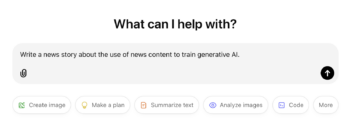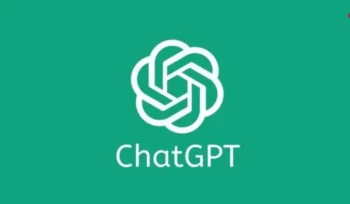TLL Editor in Chief
A coalition of Canada’s top news organizations is suing OpenAI for using its content to train its ChatGPT generative AI bot.
The coalition includes The Canadian Press wire service, Torstar, the Globe and Mail, Postmedia and CBC/Radio-Canada. For full disclosure, the author of this story worked at CBC/Radio Canada, and also wrote for The Canadian Press.

The Canadian media coalition includes the country’s top newspaper publishers and the publicly owned broadcaster CBC/Radio Canada. Torstar publishes the Toronto Star; the Globe and Mail has long been the country’s most influential national newspaper; and Postmedia publishes a range of newspapers across the country, including the national newspapers the National Post and the Financial Post.
The news outlets announced in a joint statement that OpenAI is regularly breaching copyright by ‘scraping’ large amounts of content from Canadian media websites.
“OpenAI is capitalizing and profiting from the use of this content, without getting permission or compensating content owners,” the statement said.
The coalition of media companies point out that their copyright is just as valid as the intellectual property of any other company, although news media typically suffers the issue of people reposting their stories in full on social media.
Recently, the Canadian government enacted the Online News Act to prevent social media from reposting news stories unless the news organizations are compensated with licensing fees. Social media giant Facebook has refused to do so, and in response has banned the posting of Canadian news stories on its platform. Google has agreed to abide by the new law, and has set aside a budget of $100 million to compensate Canadian news media.
This latest legal battle pits Canadian news media against the rapidly growing sector for generative artificial intelligence. The companies say they invest hundreds of millions of dollars into journalism, and all of that content is protected by copyright.
Three News Outlets Join Copyright Battle Against ChatGPT Owner OpenAI
“News media companies welcome technological innovations. However, all participants must follow the law, and any use of intellectual property must be on fair terms,” the statement said.
The problem of copyright violation for generative AI has been an ongoing problem for a variety of content producers, including visual artists, video producers, animators, authors and book publishers, and news organizations around the world.
In order to learn how to produce different types of content, generative AI models are ‘trained’ on vast databases of content. Once trained, the generative AI can produce text, images, videos and even computer code based on a text prompt from the user.
Open AI denies any wrong-doing, saying in a statement that its models are trained on data that is publicly available, and are “grounded in fair use and related international copyright principles that are fair for creators and support innovation.”
As well, Open AI says it actually works “closely with news publishers, including in the display, attribution and links to their content in ChatGPT search,” and offers outlets “easy ways to opt-out should they so desire.”
It’s pretty clear that many news organizations don’t agree.
While this is the first lawsuit of its kind in Canada, several legal actions are already underway in the United States, including a suit filed by the New York Times against Open AI and Microsoft.
Also, as it did with the issue of copyright infringement by social media, the Canadian federal government is working on potential new regulations to update its copyright laws in order to deal with the issues raised by generative AI.
The government has recently engaged in a consultation with Canadian content creators and publishers about the use of their content to train generative AI. In response, AI companies have argued that merely training their systems on various types of content doesn’t violate copyright, and raised the specter that limiting its use would greatly restrict the development of AI in Canada, and drive developers to other countries.
The Liberal government has not yet said whether the Online News Act should apply to use of copyrighted content by AI systems.
Popeye Teams Up with FORCE BLUE to Champion Conservation Missions
